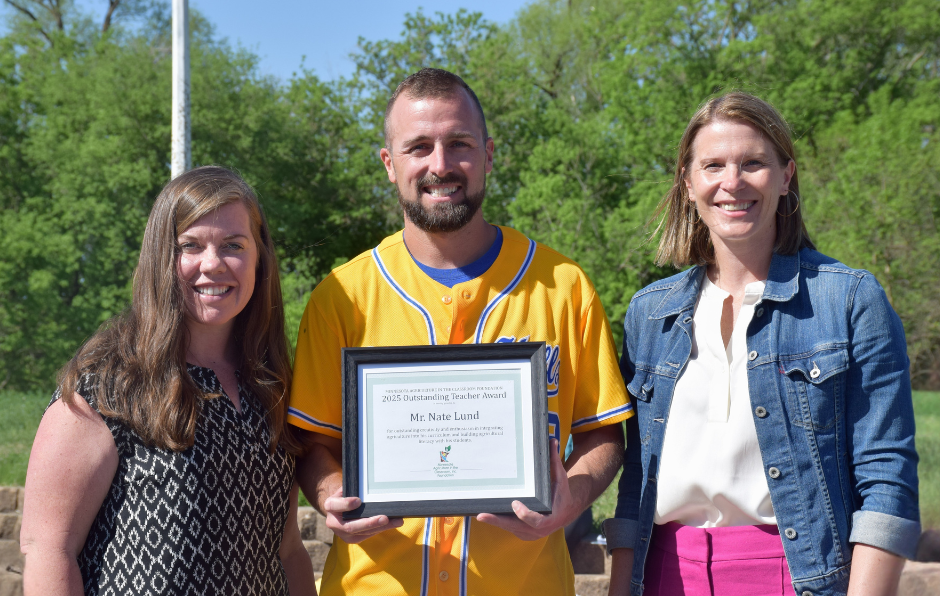Today, Americans eat from one of the safest food supplies in the world.
Minnesota Agriculture in the Classroom (MAITC) is proud to announce Nathan Lund of Glacial Hills Elementary in Starbuck, MN as the recipient of the 2025 Outstanding Teacher of the Year Award. This honor recognizes K-12 educators in Minnesota who creatively integrate agriculture concepts into their classrooms.
Lund has taught 5th and 6th grade at Glacial Hills Elementary since 2021. With his support, students in his class have gained a deeper appreciation for agriculture and the environment through hands-on learning experiences. These include starting and maintaining a schoolyard garden, incorporating hydroponic systems in the classroom, restoring native habitats around the school grounds, canning tomatoes from the garden, and hosting food-making contests. In addition, Lund launched a school-wide composting initiative with his students actively leading the effort each year.
“We were so impressed by the many ways Mr. Lund and his students are working with their community—whether it’s building outdoor learning spaces or participating in local environmental initiatives,” said Sue Knott, Education Specialist with MAITC, a program of the Minnesota Department of Agriculture (MDA). “It’s clear he is creating a lasting impact in both the classroom and throughout the broader community.”
Reflecting on his work, Lund shared “Witnessing students’ transformation into proactive environmental stewards over the past four years has been incredibly rewarding. It has reinforced my belief in the power of experiential learning to inspire real-world change and has motivated me to continue integrating environmental education and agriculture into our curriculum.”
Lund credits programs like Ag in the Classroom, Lettuce Grow, Action for Healthy Kids, and Farm to School with helping him to bring authentic agriculture experiences into the classroom. “Through all of these different experiences, it is my goal to give students many opportunities to build life skills and a love of life-long learning and growing,” says Lund.

All licensed Minnesota K-12 educators who creatively integrate agricultural into non-agricultural subjects are eligible for the MAITC Outstanding Teacher of the Year Award. As this year’s winner, Lund will receive $500 plus support to attend the National Ag in the Classroom Conference taking place in Minneapolis, MN, June 23-26.
MAITC is a partnership between the MDA and the MAITC Foundation that seeks to increase agricultural literacy through K-12 education. For free educational resources and to learn more about the Outstanding Teacher of the Year Award, visit the MAITC website.
###
Media Contact
Nikki Warner, MDA Communications
651-238-7909
Nikki.Warner@state.mn.us
February 2025 Update: Minnesota to Begin Testing Raw Cow Milk for H5N1
Beginning the week
Fertilizer Use, Nutrient Management Survey
The MDA works to understand the use of fertilizer and nutrient manageme
Renewable chemicals include polymers, plastics, and other formulated products produced from agricultural biomass, forestry
Andrew Decker
Biosecurity will be the most effective method to protect your animals. Minimize access of wild birds to cattle and their environment.
- Manage the movement of cattle and their transport as much as possible.
- Do not feed unpasteurized colostrum or milk to calves, cattle, or other mammals.
- Implement precautions for caretakers and veterinary teams handling sick cows, sick or dead birds, small mammals, and unpasteurized milk.
- Separate (quarantine) all new or returning animals for at least 21 days.
- Contact your herd veterinarian if increased cow illness is observed in your herd, specifically in second lactation or greater cows that are 150 days or more in milk.
Biosecurity will be the most effective method to protect your animals. Minimize access of wild birds to cattle and their environment.
- Manage the movement of cattle and their transport as much as possible.
- Do not feed unpasteurized colostrum or milk to calves, cattle, or other mammals.
- Implement precautions for caretakers and veterinary teams handling sick cows, sick or dead birds, small mammals, and unpasteurized milk.
- Separate (quarantine) all new or returning animals for at least 21 days.
- Contact your herd veterinarian if increased cow illness is observed in your herd, specifically in second lactation or greater cows that are 150 days or more in milk.

